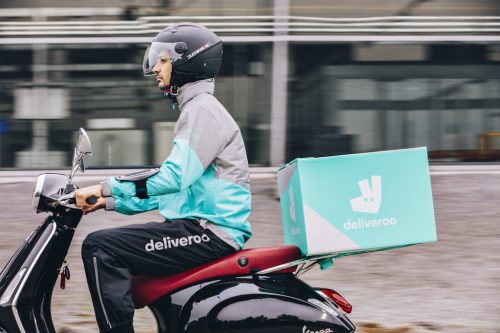The number of gig economy workers in London has soared in recent years.
Research from the New Economics Foundation (NEF) think tank finds the gig economy – where people are paid for individual tasks rather than doing a job – in the United Kingdom capital grew by over 70 percent between 2010-2016.
 New research suggests there has been a massive surge in gig economy workers in London, such as those working in transport and delivery services like Deliveroo and Uber. Image: Deliveroo
New research suggests there has been a massive surge in gig economy workers in London, such as those working in transport and delivery services like Deliveroo and Uber. Image: Deliveroo
The group’s analysis of official national statistics shows that at the start of 2010, there were 38,290 people in businesses with no employees (i.e. people classed as self-employed) in London’s transport and storage sector. By the start of 2016, this figure had grown to 65,315.
The think tank say this is where there has been massive growth in gig economy workers hired by companies such as Uber and Deliveroo who use self-employed drivers and couriers.
They note this trend is reflected in data on London’s private hire drivers – which includes Uber drivers – where numbers begin to surge around 2014.
In contrast, in the UK as a whole over the last 6 years, there has been a 28 percent growth in the overall number of non-employing businesses, and less growth in employment at other businesses.
‘Tech giants dominate market’
NEF say firms like Uber and Deliveroo are new “platform companies” that have pioneered highly successful business models that bring together GPS tracking, mobile broadband, and online payment to connect service users to providers.
They warn this business model is a significant concern for the growing numbers of gig economy workers who do not have the full employment rights or protection enjoyed by regular employees.
“Rather than the blooming of a thousand flowers, as the digital economy was supposed to encourage, we have seen the emergence of extremely powerful tech giants whose business model is to achieve market dominance and then reap the rewards,” they note.
One challenge to the business model’s way of hiring self-employed workers but treating them like employees has been won in the courts – although it has gone to appeal.
In October, a central London employment tribunal ruled that Uber drivers should not be regarded as self-employed and were entitled to workers’ rights such as being paid minimum wage, sick pay, and holiday pay.
NEF suggest a number of changes are needed to address market dominance by one or two players with deep pockets. For example, if drivers owned their own app, then “affordable rates and convenience for customers could be maintained whilst localized *network effects could be achieved.”
* The network effect refers to when the value of a product or service for a user changes depending on how many people use the product or subscribe to the service. As the number of users increase, so does the network effect.
Another way to spur competition would be make data portable, urge NEF. Thus, give users the ability to move their data and profiles from one platform to another – so if I am not happy with Uber, then I should be able to take my hard-won ratings history to another provider.
